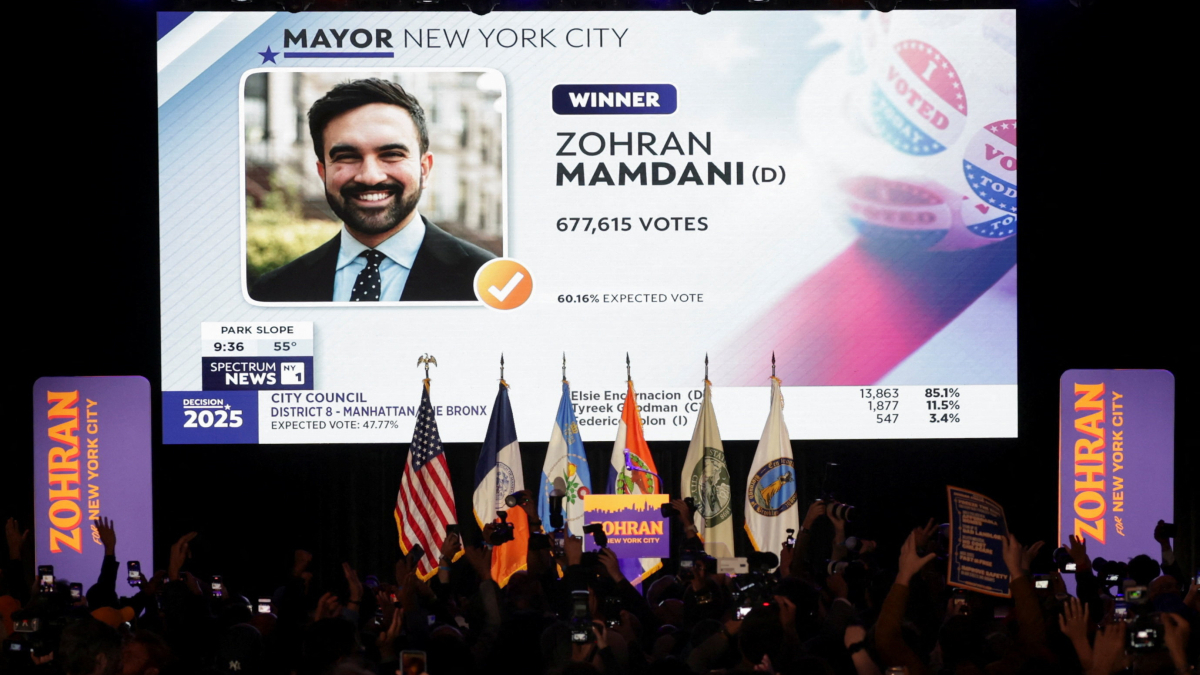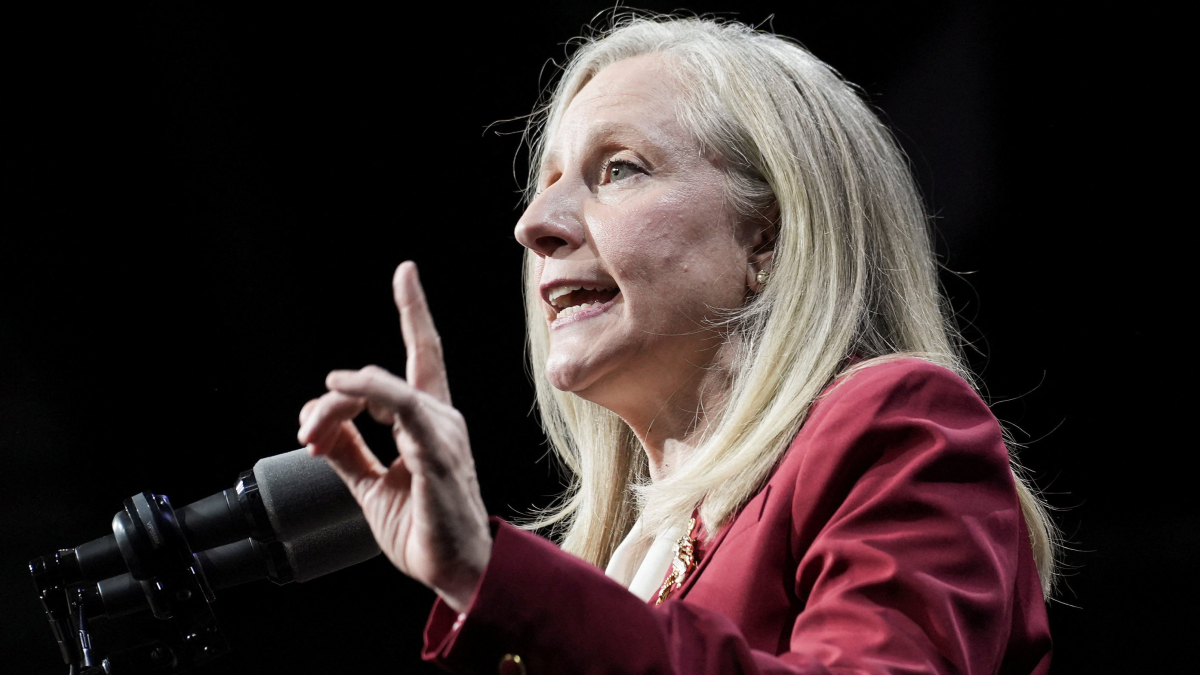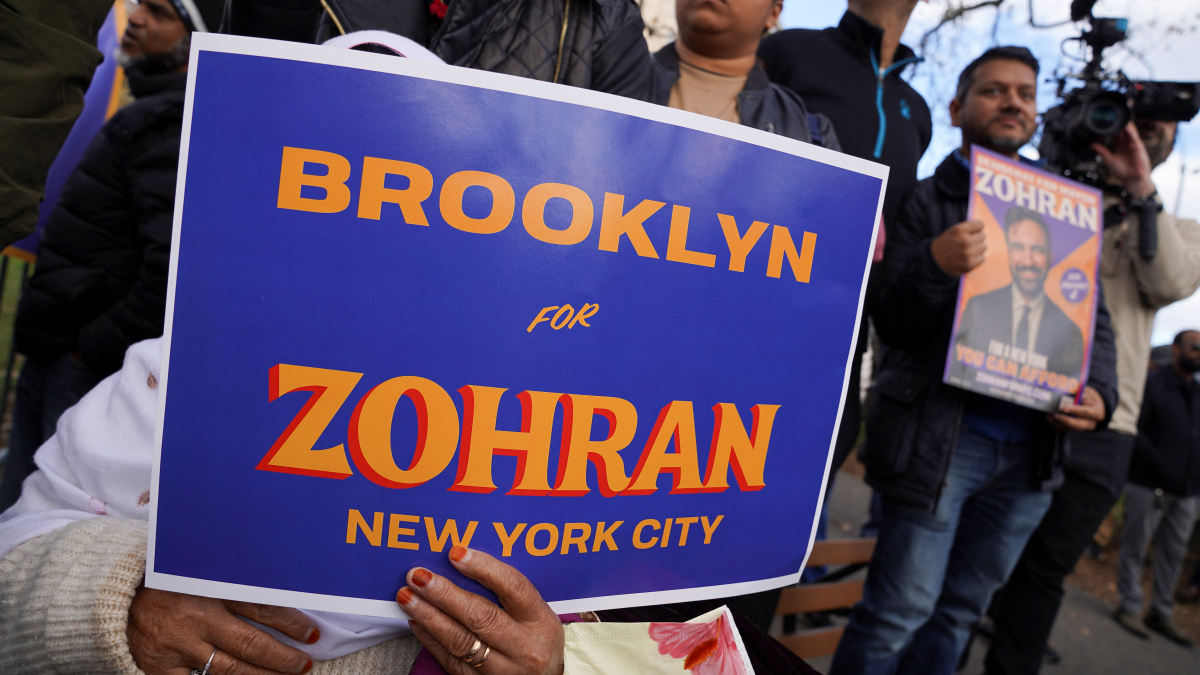Trump says he will raise global tariff rate from 10% to 15%
U.S. President Donald Trump said on Saturday (21 February) he will raise to 15% the temporary global tariff rate on imported goods imposed after the U...
Democratic socialist Zohran Mamdani has won New York City’s mayoral election, defeating former Governor Andrew Cuomo in a landmark victory that makes him the city’s first Muslim mayor.
Zohran Mamdani, 34, secured a decisive victory in New York City’s mayoral race on Tuesday, completing a remarkable ascent from a state lawmaker to one of the most visible figures in the Democratic Party. His triumph makes him the first Muslim mayor of the largest city in the United States.
Mamdani’s win over 67-year-old former Governor Andrew Cuomo, who ran as an independent after losing the Democratic nomination, reflected a broader clash within the party — one between an entrenched establishment and a rising progressive movement. The contest also served as an early test of the Democrats’ future direction following a year of political setbacks.
Mamdani campaigned on an ambitious left-wing agenda centred on housing and public services, promising to freeze rents for nearly one million apartments and make city buses free. His message of affordability and inclusion resonated with younger, diverse voters across the city.

More than two million ballots were cast in New York, the highest turnout for a mayoral race since 1969, according to the city’s Board of Elections. Analysts say Mamdani’s victory may redefine Democratic politics in major urban centres.
The momentum for Democrats extended beyond New York. In Virginia, Democrat Abigail Spanberger won the governorship in a historic landslide, becoming the state’s first woman governor. Meanwhile, in New Jersey, Democrat Mikie Sherrill captured the governor’s office, further boosting the party’s morale.
The three major victories provided Democrats with a rare moment of relief after months of political turbulence. With control of Congress at stake in the 2026 midterms, the results gave the party new insights into which campaign strategies might resonate most effectively.

While Spanberger and Sherrill ran as moderates emphasising pragmatism and bipartisanship, Mamdani offered an unapologetically progressive alternative. All three, however, focused on the same central issue: economic strain and affordability.
Spanberger, who defeated Republican Lieutenant Governor Winsome Earle-Sears, pledged to unite Virginians across party lines.
"We sent a message to the world that in 2025 Virginia chose pragmatism over partisanship," she said in her victory speech. "We chose our Commonwealth over chaos."
The elections unfolded under the shadow of President Donald Trump’s ongoing government shutdown and divisive economic measures. His administration’s threat to dismiss federal employees particularly affected Virginia, a state with a large population of government workers. He also froze billions in funding for a new Hudson River train tunnel — a critical infrastructure project for New Jersey commuters.
At Virginia polling stations, many voters cited Trump’s policies as a deciding factor. Juan Benitez, a 25-year-old restaurant manager voting for the first time, said he supported all Democratic candidates because of his opposition to the administration’s immigration policies and its handling of the shutdown.
Meanwhile, California voters were considering whether to give Democratic lawmakers authority to redraw the state’s congressional map. The measure has national implications for redistricting and future control of the U.S. House of Representatives. Trump called the vote a scam on social media, alleging — without evidence — that it was rigged.
Turnout was notably strong across all three states. Early voting in Virginia and New Jersey exceeded 2021 levels, while New York saw record participation. Still, analysts cautioned against reading too much into the results ahead of the 2026 midterms.
"There’s nothing that’s going to happen in Virginia or New Jersey that’s going to tell us much about what will happen in a congressional district in Missouri or a Senate race in Maine," said Republican strategist Douglas Heye.
For Republicans, Tuesday’s elections measured whether the coalition that carried Trump to victory in 2024 could endure when he was not on the ballot. GOP candidates Jack Ciattarelli in New Jersey and Winsome Earle-Sears in Virginia faced a difficult balance: distancing themselves from Trump risked alienating his loyalists, but embracing him too closely could repel moderates.
Trump remains unpopular nationally. According to a Reuters/Ipsos poll, 57% of Americans disapprove of his performance. Yet Democrats have not significantly benefited, with voters evenly split on which party they prefer heading into 2026.
For now, Mamdani’s victory stands out as both a political and cultural milestone — marking a new chapter in New York City’s history and perhaps a glimpse of the Democratic Party’s future. His promise of progressive reform, combined with record turnout, underscores a growing appetite for generational change within the party’s urban strongholds.

Quentin Griffiths, co-founder of online fashion retailer ASOS, has died in Pattaya, Thailand, after falling from the 17th floor of a condominium on 9 February, Thai police confirmed.
At least four people have died and 17 others were injured after a liquid gas truck overturned and exploded in Santiago, Chile’s capital, authorities confirmed on Thursday. Police said the driver was among those killed.
Cubans are increasingly turning to solar power to keep businesses operating and basic household appliances running during prolonged electricity cuts, as fuel shortages make diesel generators and other temporary solutions more difficult and costly to maintain.
Ukraine’s National Paralympic Committee has announced it will boycott the opening ceremony of the Milano Cortina 2026 Paralympics in Verona on 6 March, citing the International Paralympic Committee’s decision to allow some Russian and Belarusian athletes to compete under their national flags.
Eric Dane, the actor best known for his roles in 'Grey’s Anatomy' and 'Euphoria', died on Thursday, at the age of 53 after a battle with amyotrophic lateral sclerosis (ALS). His family confirmed his death after what they described as a “courageous battle” with ALS.
U.S. President Donald Trump said on Saturday (21 February) he will raise to 15% the temporary global tariff rate on imported goods imposed after the U.S. Supreme Court ruled against the tariffs he imposed under an economic emergency law.
Germany's ruling conservatives on Saturday (21 February) passed a motion to ban social media use for under 14s and introduce more stringent digital verification checks for teenagers, building momentum for such limits in Germany and elsewhere in Europe.
India and Brazil signed a mining and minerals cooperation pact on Saturday (21 February), as Prime Minister Narendra Modi said the two countries aim to increase bilateral trade to more than $20 billion within five years.
The Russian Defence Ministry claimed on Saturday (21 February) that its forces had captured another settlement in eastern Ukraine.
The U.S. military carried out a strike on Friday (20 February) against a vessel allegedly involved in narcotrafficking in the Eastern Pacific, according to U.S. Southern Command (SOUTHCOM).
You can download the AnewZ application from Play Store and the App Store.

What is your opinion on this topic?
Leave the first comment